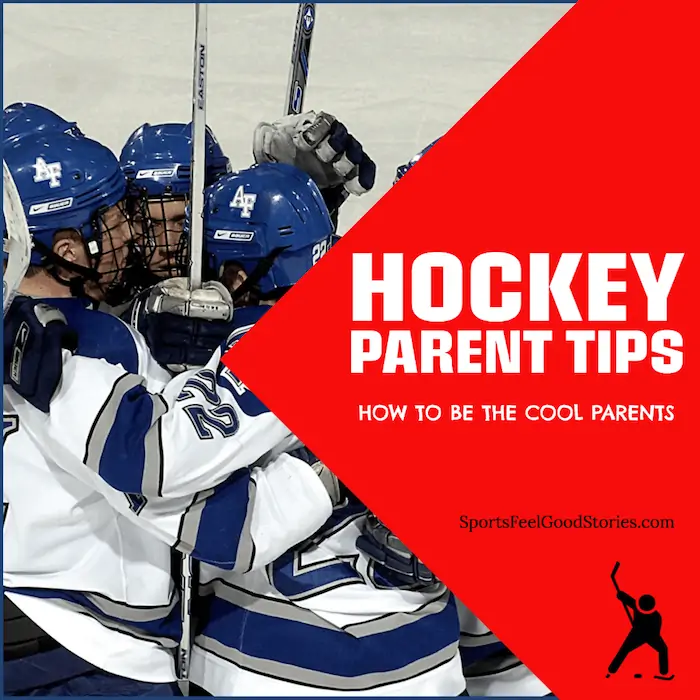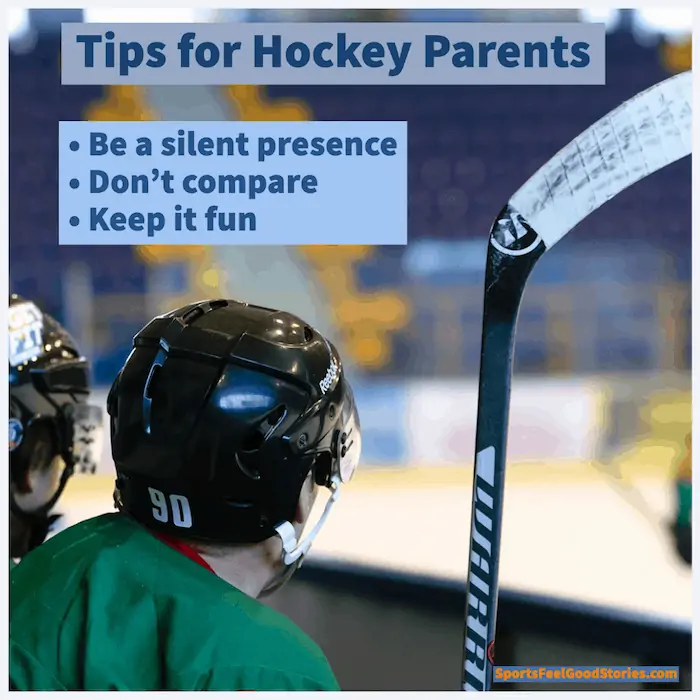Attention Hockey Parents: If you have seen any of my previous hockey posts, then you may be aware that I am a hockey mom. I fill this role in two ways.
First, I love to watch hockey with my family. Second, I have two boys in hockey and a husband who supports their teams as a dad, a coach, and a trainer. With this experience, I will offer some tried and tested tips for being a hockey parent.
Key Takeaways For Hockey Parents
1.) Consider your presence for your child like a support animal. You provide support and are always there to offer comfort and a listening ear. You remain calm even if your child, the coach, or the referee is a mess.
2.) Look into taking a course to understand better how the game is run.
3.) Keep hockey fun for your child.
4.) Don’t compare your child with another; focus on their development, keep a positive attitude, avoid politics, and know when it’s time to call it quits.

How it Works for the Volunteers, Coaches, and Other Activity Leaders
When my husband first became involved in my eldest’s team, it was solely as a volunteer. Where I live, they don’t put a cap on the number of children who want to experience playing hockey. I think that’s great, but it does put pressure on the coaches to ensure that there are enough to manage each team.
So, when the coach reached out to the parents after a game asking for volunteers to help, my husband was excited to offer his services. But before he could jump onto the ice, he was required to take a course.
This course goes over the fundamentals of what it means to have respect in sports.
Volunteers, coaches, and other activity leaders are expected to be role models for the young athletes in their care. They learn about abuse, harassment, discrimination, and bullying, including ways to prevent and build an accepting environment for all.
For the most part, everyone within the community understands this. And I found that when your children are playing house league, the competitive nature often isn’t that steep. That said, if your child plays at a more elite level, I would argue it wouldn’t hurt parents to take these courses too.
Often, as was the case with my husband, a volunteer will progress to a more active role, such as a coach or trainer. In this case, the courses become more advanced. All of these activity leaders are to behave appropriately and hold themselves to a high standard.
Parents are directly involved in their children’s lives, yet still, there is no course for parents. So, with that in mind, let me offer a crash course in the fundamentals of what it means to be a hockey parent.
Hockey Parents: A Quiet Presence
Every child does it. They look up to the stands to see if their parents are among the spectators. And while some may act embarrassed if you wave at them with excitement, deep down, they are happy that you are there.
But being a hockey parent comes with a set of unspoken guidelines to ensure that your child reaps all the rewards that hockey has to offer. And in that set of guidelines, being a quiet presence may be number one.
Coaches understand that you may be experienced with the game, but so are they, so let them do their jobs.
This means that while it may be tempting to question the coach or referees about plays or calls made, don’t. I understand that as parents, it’s our first instinct to want to protect our kids. But keep in mind they feel and hear everything we do.
If we make a fuss because we think our child is not getting enough ice time, for example, these actions have consequences. First, our child sees how we act as appropriate behavior. Second, you may win, but now another child may get less time. Third, you may lose, and ice time is still limited. Lastly, you have created animosity between the parents, coaches, and yourself, but more importantly, among the kids.
Try and take a different approach in this situation, such as working on your child’s hockey skills. If you think they are not as fast as the others, get them skating more. If you believe their stick handling needs more practice, then get out and practice with them. But ultimately, making a fuss won’t change or improve the situation. Time well spent with your child will.
I’d like to share the following video of some young hockey children talking about respect in hockey. I hope that it puts some things in perspective, particularly when you hear it coming directly from their mouths.
Respect in Hockey Video
Keep the Fun in Hockey
The reason we play hockey and sign our kids up for it is not just because it gives them valuable skills, but it’s also fun. Once we stop having fun, is it worth playing? Yes, progressing through the levels may increase the intensity, but enjoyment is still the most important part.
And if you think that being a professional means you don’t still get to have fun. Watch defenseman P.K. Subban crash a street hockey game in the video below.
P.K.Subban Playing Street Hockey Video
Other Important Guidelines for Hockey Parents
Now that we’ve addressed the idea of being a quiet presence for your child, let’s look at a few other unspoken guidelines I’ve learned over the years.
Don’t Compare
Comparing your child to another is like comparing apples to oranges. Every child is different, and comparison only lowers their confidence and self-worth. The best hockey parents provide encouragement, not comparisons.
Focus on Their Development
Remember, it’s the journey that counts the most. Your child may be on a team that loses every game. But rather than focus on the W instead, watch how much your child’s skill levels have progressed.

Status Doesn’t Guarantee Success
Hockey parents who have visions of their children playing for the NHL often focus on their children’s level of play. What many don’t realize is that children develop at different stages. Some children may be advanced at a young age, only to level out later on. Others get better as they get older and their passion increases.
Coaches and teammates also have an influential impact on how they progress. I have witnessed my husband receive thanks from a parent who was grateful that he spent time with their kid on the ice. All of these moments can have a significant impact on how a child progresses through their hockey career, often much more than their status.
A little reality check is needed for many parents. Please realize that very few players go pro. Being a Wayne Gretzky type star, or even making it to the NHL, is incredibly rare.
Attitude is Everything
One of my favorite movies is The Breakfast Club. This movie is a character played by Emilio Esteves by the name of Andrew Clark. He played the role of an athlete with a father who pushed him to the limit to succeed. This wreaked havoc on him mentally, and the result is a harmful prank with detention as a consequence.
Here is the video for anyone who hasn’t seen the movie. A warning that it does contain some adult language and content.
The Breakfast Club
As someone who has seen this movie one hundred times (at least), I can easily recall Andrew breaking down because of his father’s intensity. And while encouraging your child is important, a positive attitude for every outcome is equally important.
Missed opportunities, bad plays, and game losses don’t need to be gone over with a magnifying glass. The coach will likely already draw attention to the team about these things (depending on their level). They don’t need their greatest supporter: you, the parents, to do the same.
Know When to Call It
As a child, I didn’t play hockey. I danced. I loved dancing, but as I got older, it became less fun because the other girls took it more seriously than I did and were very competitive.
When I turned 16, my mom asked me if I was still having fun, and I had to admit I wasn’t anymore. That was my last year of dance, and I can honestly say I got out before my love of dance would be tarnished forever.
Avoid the Politics
If you are like my husband, you may find yourself persuaded to help with the game. You may be a volunteer, an assistant coach, or even a parent who brings snacks. All of these are great ways to become involved in a positive way.
But the moment a parent tries to declare mutiny on the coach or starts talking trash against another parent or child, step away. How you behave off the ice follows you and your child around for years to come. If your child does progress well, your reputation as a meddler can impact how they are received.
Learn About the Game
Hockey is expensive. Between paying for the season, extra classes, or equipment that they will grow out of in the blink of an eye, it adds up. Not having proper knowledge of how your child can progress can mean that they miss out on opportunities. If you and your child are serious about advancing, ask questions and be informed.
Final Thoughts
I can remember my eldest’s first tryouts like it was yesterday. In some ways, I felt like we had dropped the ball. A reminder, in Canada, hockey is huge. And in case you didn’t get that, I’ll say that again, in Canada, hockey is huge. The number of courses and skill classes is excessive.
So, when my son fell on the ice 100 times in the span of half an hour while every other kid seemed to glide on the ice like professionals, my heart sank. I couldn’t help but think, should we have been doing more? With our family’s passion for the game, all my children should be excelling, no?
But when I look back on it now and see how far he has come, I no longer question myself. Instead, I see the joy he has in playing the game, remembering the two biggest golden rules, being a quiet presence, and that hockey is ultimately about having fun.
By Danielle L’Ami
Danielle is a writer who, if you couldn’t tell, lives in Canada. As the mother of two hockey players, she has seen a lot of good (and bad) hockey parenting.

Overtime
You are on our Hockey Parents: Tips For Being Chill page.
You might like:
